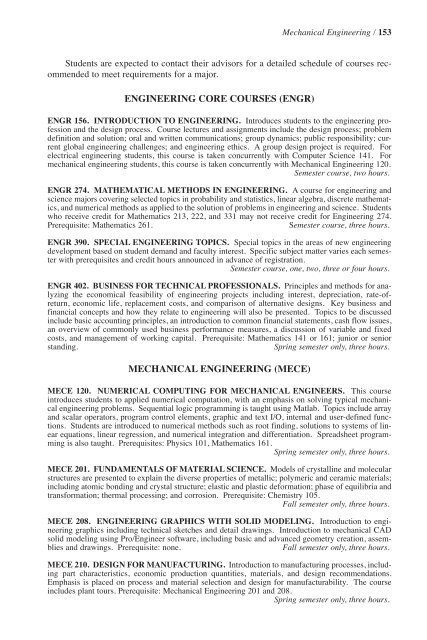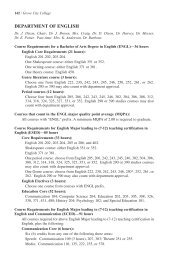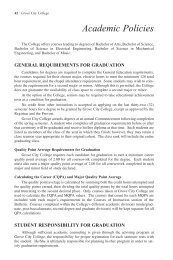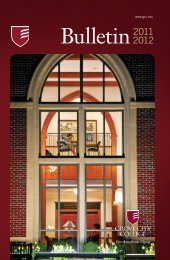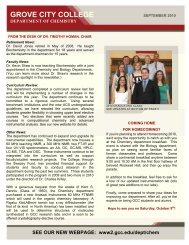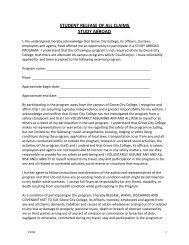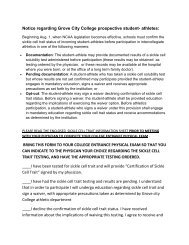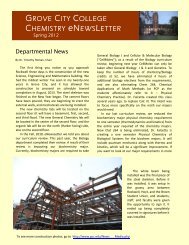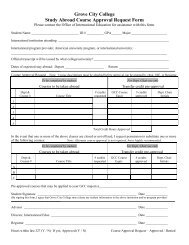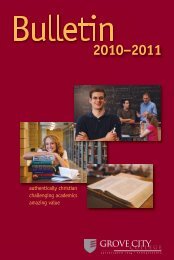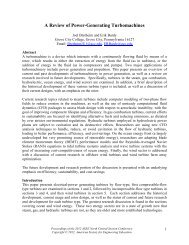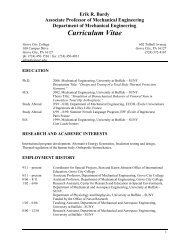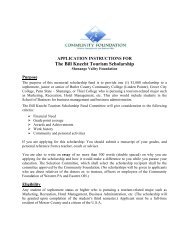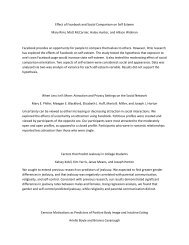2009–2010 - Grove City College
2009–2010 - Grove City College
2009–2010 - Grove City College
Create successful ePaper yourself
Turn your PDF publications into a flip-book with our unique Google optimized e-Paper software.
Mechanical Engineering / 153<br />
Students are expected to contact their advisors for a detailed schedule of courses recommended<br />
to meet requirements for a major.<br />
ENGINEERING CORE COURSES (ENGR)<br />
ENGR 156. INTRODUCTION TO ENGINEERING. Introduces students to the engineering profession<br />
and the design process. Course lectures and assignments include the design process; problem<br />
definition and solution; oral and written communications; group dynamics; public responsibility; current<br />
global engineering challenges; and engineering ethics. A group design project is required. For<br />
electrical engineering students, this course is taken concurrently with Computer Science 141. For<br />
mechanical engineering students, this course is taken concurrently with Mechanical Engineering 120.<br />
Semester course, two hours.<br />
ENGR 274. MATHEMATICAL METHODS IN ENGINEERING. A course for engineering and<br />
science majors covering selected topics in probability and statistics, linear algebra, discrete mathematics,<br />
and numerical methods as applied to the solution of problems in engineering and science. Students<br />
who receive credit for Mathematics 213, 222, and 331 may not receive credit for Engineering 274.<br />
Prerequisite: Mathematics 261. Semester course, three hours.<br />
ENGR 390. SPECIAL ENGINEERING TOPICS. Special topics in the areas of new engineering<br />
development based on student demand and faculty interest. Specific subject matter varies each semester<br />
with prerequisites and credit hours announced in advance of registration.<br />
Semester course, one, two, three or four hours.<br />
ENGR 402. BUSINESS FOR TECHNICAL PROFESSIONALS. Principles and methods for analyzing<br />
the economical feasibility of engineering projects including interest, depreciation, rate-ofreturn,<br />
economic life, replacement costs, and comparison of alternative designs. Key business and<br />
financial concepts and how they relate to engineering will also be presented. Topics to be discussed<br />
include basic accounting principles, an introduction to common financial statements, cash flow issues,<br />
an overview of commonly used business performance measures, a discussion of variable and fixed<br />
costs, and management of working capital. Prerequisite: Mathematics 141 or 161; junior or senior<br />
standing. Spring semester only, three hours.<br />
MECHANICAL ENGINEERING (MECE)<br />
MECE 120. NUMERICAL COMPUTING FOR MECHANICAL ENGINEERS. This course<br />
introduces students to applied numerical computation, with an emphasis on solving typical mechanical<br />
engineering problems. Sequential logic programming is taught using Matlab. Topics include array<br />
and scalar operators, program control elements, graphic and text I/O, internal and user-defined functions.<br />
Students are introduced to numerical methods such as root finding, solutions to systems of linear<br />
equations, linear regression, and numerical integration and differentiation. Spreadsheet programming<br />
is also taught. Prerequisites: Physics 101, Mathematics 161.<br />
Spring semester only, three hours.<br />
MECE 201. FUNDAMENTALS OF MATERIAL SCIENCE. Models of crystalline and molecular<br />
structures are presented to explain the diverse properties of metallic; polymeric and ceramic materials;<br />
including atomic bonding and crystal structure; elastic and plastic deformation; phase of equilibria and<br />
transformation; thermal processing; and corrosion. Prerequisite: Chemistry 105.<br />
Fall semester only, three hours.<br />
MECE 208. ENGINEERING GRAPHICS WITH SOLID MODELING. Introduction to engineering<br />
graphics including technical sketches and detail drawings. Introduction to mechanical CAD<br />
solid modeling using Pro/Engineer software, including basic and advanced geometry creation, assemblies<br />
and drawings. Prerequisite: none. Fall semester only, three hours.<br />
MECE 210. DESIGN FOR MANUFACTURING. Introduction to manufacturing processes, including<br />
part characteristics, economic production quantities, materials, and design recommendations.<br />
Emphasis is placed on process and material selection and design for manufacturability. The course<br />
includes plant tours. Prerequisite: Mechanical Engineering 201 and 208.<br />
Spring semester only, three hours.


